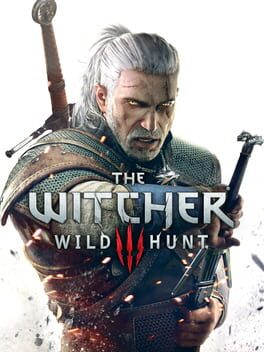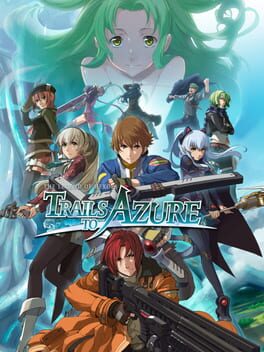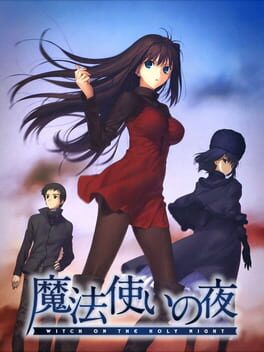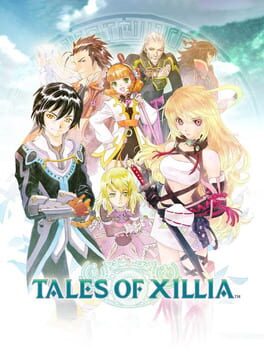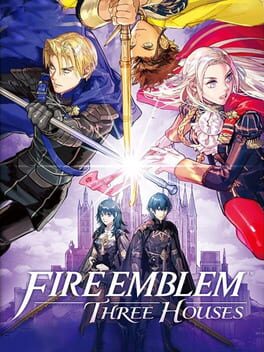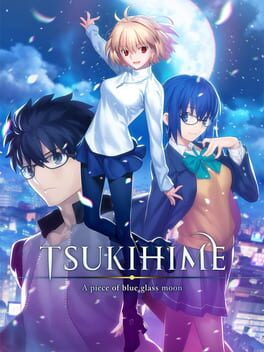Outsso
10 reviews liked by Outsso
The Witcher 3 is, now that I've played it, officially a part of the Holy Trinity of Western RPG's with Red Dead Redemption 2 and Mass Effect 3 due to its tremendous character writing, unparalleled world building and lore, and overall style. Seriously, there is not one thing about this game that after completion, I felt it needed.
Characters in the Witcher, be it in the games, show, or books, are the definitive strongsuit and most important aspect as set in place by Andrzej Sapkowski way back in the 90's when first creating the story of Geralt that would eventually sweep the world by storm. Everybody in the series matters, nobody is intrinsically good, nobody is faultless. Geralt of Rivia, who is probably the greatest protagonist in video game history is a man of imperfection, a mutated shell of a human whose history is marred with bloodshed and tragedy. Geralt never looks back though, he is a pragmatist with a heart. I've never encountered a character in a series who is as multi-faceted and believable as Geralt. He bows to nobody and adheres to his own code, owes no alleigances to men of state or people of power, loves those who he wants to love, and is confident in his staggering ability in combat. One beautiful aspect of the series is how often you split between fighting and conversation, as the history of the continent and people within are decided by Geralt's words, which he carefully must pick and cater to those he speaks with. He is a sly and cunning man, and always cognizant of the intentions of those around him, he is no fool. He knows his love for Ciri, Yennefer, and Vesimir can lead him astray, but his abilties make up for it.
The protagonist Geralt takes center stage as the player character and decision maker within the story, but every single character within the world crafts what is the greatest low-fantasy adventure and most well fleshed out world in video game history. Secondary characters like Yennefer, Triss, Vesimir, Ciri, Dandelion, Zoltan, Keira, Djikstra, Ehmyr, and many more add an invaluable amount to not only the story, but the passion behind the player's actions. Each character has their own unique motives, their own special relationship to Geralt and the others around, their own piece that fits together for the final puzzle. You spend hours seperately with each of these characters, disputing romance, debating politics, bargaining, and laughing in good faith. The depth that The Witcher 3 goes in to with your supporting cast, without ever overstaying its welcome is only paralleled with one game, Red Dead Redemption 2. I only want to spend MORE hours with the Witchers of Kaer Morhan, with the two beautiful Sorceresses in Triss and Yennefer learning about their world and complicated relationships with Geralt, with the beautiful and evasive Cirilla, and countless others. Few games are like the Witcher 3 and have you smiling when you reunite with characters from previous games or books, when I met with Roche for the first time I jumped with joy, same as with the lovable duo of Dandelion and Zoltan. I can not drive the point home enough, these side characters are some of the most fleshed out peers and comrades of any video game ever. Even the more minor characters, involved in singular quest chains like the Bloody Baron, Cerys, or [REDACTED DUE TO SPOILERS] leave a mark that you shant forget, as their memories and experiences add an extreme amount to the overall journey.
Now, this is clearly evident to anybody who has seen the show or read any of the books, but aside from the characters, the thing that lays the groundwork for the Witcher's success as a game franchise is the beautiful worldbuilding by Andrzej Sapkowski. EVERYTHING from the Eastern-European influenced folklore to the medieval European architecture and setting is meticulously laid out with extreme thought and care. The cities withing the Witcher 3 feel like real Medieval cities reflecting of their culture. The royal castle of Vizima feels like that befitting of a grand emperor, the free city of Novigrad is one of the most impressive and fleshed out cities in any video game in the history of the medium, and the multiple communities within Skellige are a thing of Scandinavian beauty. The towns and world were so beautiful to traverse, many a moment was spent stopping and staring at the colorful countrysides. Disclaimer, I did play this game with a 4K texture pack enabled to make the pretty things more pretty. But man, I could speak for days about how REAL this felt as a fantasy setting. There is a perfect balance of power within the universe of the Witcher, and that is evident in its third entry. Sorceresses are extremely powerful, yet their volatility is too high for excessive power usage. The Wild Hunt are an impressively scary force, however they are kept in check by certain abilities that will be explained. Geralt and the Witchers themself are the strongest of human warriors, however they are the last of a dying breed. The power in the Witcher series is kept in check by wit and chess-like geopolitics, as it would be in an actual medieval setting. Not by a superhero or undefeatable protagonist. The Witcher is a carefuilly crafted universe of lore that has been in motion for nearly thirty years, culminating with the effort that it took to get to The Witcher 3: Wild Hunt. Each narrative empowering, passionate, and given an incredible amount of thought.
The music of the Witcher 3 is something of note as well, and those who have played this game can easily find a common ground in this aspect, whether they liked the other aspects or not. These songs are long and drawn out, borrowing aspects from Medieval instruments and fantasy choruses and sounds. Each song, whether its for a specific zone or character, couples with the mood and settings perfectly without any shadow of a doubt. I paused when I was riding the trusty steed Roach through the winding hills of Skelige as the beautiful soundtrack played and looked at the open ocean. I was in awe, completely lost in the world. I felt like Geralt, wind howling and hitting my face on a horse looking over a familiar crag. It's moments that games like this and RDR2 nail that have the player completely divulged into the immersive nature that they put forth.
The only knocks I can give the Witcher 3 is the combat being far less than stellar in difficult and rigidity, and the ham-fisted relationship with Yennefer that is more of a qualm I have with the series as a whole. The former is excusable with the addition of the points I made above, however the latter irked me to a fairly large degree. I don't like Yennefer, full stop, which is interesting because she is clearly Geralt's canon love interest if you know anything about the series or have played even a few minutes of this game. The topic of whether I like her or not is strictly an opinion of subjective nature and each player is left to their own vices in that regard, however my qualm for this post is moreso how the game deals with that if you pick Triss as your romantic option. The game does a mostly great job in dealing with this, even hiding nuggets of voice lines in conversation about the awkwardness of having Yennefer around when you're romantically involved with the sorceress you spent time with in the last few games. It does get a little awkward sometimes when there are plot elements that pair you with Yennefer and imply that she is your betrothed, but as this review is a five star review, that is clearly not enough to detract any major points away from the game.
I had not played the Witcher 3 until now because I was not a fan of the low-fantasy medieval setting. Once I played the Witcher 2, I became invested and watched the show, read some books, and became completely enthralled in the world of Geralt. With the Witcher 3: Wild Hunt you have a tremendously crafted narrative, flawlessly written memorable and diverse characters, a lively fleshed out world with a cavernous lore and history, and a magnificent soundtrack that thrusts immersion into the the player.
I strongly recommend The Witcher 3 to those who are looking for a narrative video game journey that they will not forget.
Characters in the Witcher, be it in the games, show, or books, are the definitive strongsuit and most important aspect as set in place by Andrzej Sapkowski way back in the 90's when first creating the story of Geralt that would eventually sweep the world by storm. Everybody in the series matters, nobody is intrinsically good, nobody is faultless. Geralt of Rivia, who is probably the greatest protagonist in video game history is a man of imperfection, a mutated shell of a human whose history is marred with bloodshed and tragedy. Geralt never looks back though, he is a pragmatist with a heart. I've never encountered a character in a series who is as multi-faceted and believable as Geralt. He bows to nobody and adheres to his own code, owes no alleigances to men of state or people of power, loves those who he wants to love, and is confident in his staggering ability in combat. One beautiful aspect of the series is how often you split between fighting and conversation, as the history of the continent and people within are decided by Geralt's words, which he carefully must pick and cater to those he speaks with. He is a sly and cunning man, and always cognizant of the intentions of those around him, he is no fool. He knows his love for Ciri, Yennefer, and Vesimir can lead him astray, but his abilties make up for it.
The protagonist Geralt takes center stage as the player character and decision maker within the story, but every single character within the world crafts what is the greatest low-fantasy adventure and most well fleshed out world in video game history. Secondary characters like Yennefer, Triss, Vesimir, Ciri, Dandelion, Zoltan, Keira, Djikstra, Ehmyr, and many more add an invaluable amount to not only the story, but the passion behind the player's actions. Each character has their own unique motives, their own special relationship to Geralt and the others around, their own piece that fits together for the final puzzle. You spend hours seperately with each of these characters, disputing romance, debating politics, bargaining, and laughing in good faith. The depth that The Witcher 3 goes in to with your supporting cast, without ever overstaying its welcome is only paralleled with one game, Red Dead Redemption 2. I only want to spend MORE hours with the Witchers of Kaer Morhan, with the two beautiful Sorceresses in Triss and Yennefer learning about their world and complicated relationships with Geralt, with the beautiful and evasive Cirilla, and countless others. Few games are like the Witcher 3 and have you smiling when you reunite with characters from previous games or books, when I met with Roche for the first time I jumped with joy, same as with the lovable duo of Dandelion and Zoltan. I can not drive the point home enough, these side characters are some of the most fleshed out peers and comrades of any video game ever. Even the more minor characters, involved in singular quest chains like the Bloody Baron, Cerys, or [REDACTED DUE TO SPOILERS] leave a mark that you shant forget, as their memories and experiences add an extreme amount to the overall journey.
Now, this is clearly evident to anybody who has seen the show or read any of the books, but aside from the characters, the thing that lays the groundwork for the Witcher's success as a game franchise is the beautiful worldbuilding by Andrzej Sapkowski. EVERYTHING from the Eastern-European influenced folklore to the medieval European architecture and setting is meticulously laid out with extreme thought and care. The cities withing the Witcher 3 feel like real Medieval cities reflecting of their culture. The royal castle of Vizima feels like that befitting of a grand emperor, the free city of Novigrad is one of the most impressive and fleshed out cities in any video game in the history of the medium, and the multiple communities within Skellige are a thing of Scandinavian beauty. The towns and world were so beautiful to traverse, many a moment was spent stopping and staring at the colorful countrysides. Disclaimer, I did play this game with a 4K texture pack enabled to make the pretty things more pretty. But man, I could speak for days about how REAL this felt as a fantasy setting. There is a perfect balance of power within the universe of the Witcher, and that is evident in its third entry. Sorceresses are extremely powerful, yet their volatility is too high for excessive power usage. The Wild Hunt are an impressively scary force, however they are kept in check by certain abilities that will be explained. Geralt and the Witchers themself are the strongest of human warriors, however they are the last of a dying breed. The power in the Witcher series is kept in check by wit and chess-like geopolitics, as it would be in an actual medieval setting. Not by a superhero or undefeatable protagonist. The Witcher is a carefuilly crafted universe of lore that has been in motion for nearly thirty years, culminating with the effort that it took to get to The Witcher 3: Wild Hunt. Each narrative empowering, passionate, and given an incredible amount of thought.
The music of the Witcher 3 is something of note as well, and those who have played this game can easily find a common ground in this aspect, whether they liked the other aspects or not. These songs are long and drawn out, borrowing aspects from Medieval instruments and fantasy choruses and sounds. Each song, whether its for a specific zone or character, couples with the mood and settings perfectly without any shadow of a doubt. I paused when I was riding the trusty steed Roach through the winding hills of Skelige as the beautiful soundtrack played and looked at the open ocean. I was in awe, completely lost in the world. I felt like Geralt, wind howling and hitting my face on a horse looking over a familiar crag. It's moments that games like this and RDR2 nail that have the player completely divulged into the immersive nature that they put forth.
The only knocks I can give the Witcher 3 is the combat being far less than stellar in difficult and rigidity, and the ham-fisted relationship with Yennefer that is more of a qualm I have with the series as a whole. The former is excusable with the addition of the points I made above, however the latter irked me to a fairly large degree. I don't like Yennefer, full stop, which is interesting because she is clearly Geralt's canon love interest if you know anything about the series or have played even a few minutes of this game. The topic of whether I like her or not is strictly an opinion of subjective nature and each player is left to their own vices in that regard, however my qualm for this post is moreso how the game deals with that if you pick Triss as your romantic option. The game does a mostly great job in dealing with this, even hiding nuggets of voice lines in conversation about the awkwardness of having Yennefer around when you're romantically involved with the sorceress you spent time with in the last few games. It does get a little awkward sometimes when there are plot elements that pair you with Yennefer and imply that she is your betrothed, but as this review is a five star review, that is clearly not enough to detract any major points away from the game.
I had not played the Witcher 3 until now because I was not a fan of the low-fantasy medieval setting. Once I played the Witcher 2, I became invested and watched the show, read some books, and became completely enthralled in the world of Geralt. With the Witcher 3: Wild Hunt you have a tremendously crafted narrative, flawlessly written memorable and diverse characters, a lively fleshed out world with a cavernous lore and history, and a magnificent soundtrack that thrusts immersion into the the player.
I strongly recommend The Witcher 3 to those who are looking for a narrative video game journey that they will not forget.
NieR: Automata
2017
This review contains spoilers
The purpose of a critique is to take something apart to reveal a flawed construction or a shaky foundation, so it’s with some reluctance that I take on a modern classic with only an arm full of rocks to break the windows. I may have personally found this game to be a slog, but its straightforward action doesn’t actually have any fundamental problems. It tells a story with a lot of twists and turns, it develops its characters, there really doesn’t seem to be anything wrong with it. So, here’s the brick I intend to throw at it:
What is Nier: Automata about? Not in terms of plot, what are its themes and core ideas?
This question probably sounds insane. How could you not pick up on its absurdist ideas? How could you not notice how existentialism is core to its central conflict? Well obviously, I did, but the ridiculousness of the question is exactly my point. Nier: Automata leaves so little to the imagination, so little for you to wonder about and consider on your own that it ultimately works against its own interests. Naming someone “2B” in an existential game is a pretty cheeky move, and naming a traitor character “A2” starts to get into eye-rolling territory. When the two protagonists who work for an inscrutable authority wear blindfolds, and the one who left the organization has her eyes open, it's just painfully on the nose. Introducing the machine-fighting heroes as androids themselves, and having them state “There’s no actual meaning behind anything machines do” within the first thirty minutes signposts the direction of the plot so clearly that it kills the intrigue. Examples like these are dotted all over the game, like how the moral absoluteness of Yorha has literally made their base viewable only in black and white, and how most secondary characters are named after philosophers who tangentially relate to the game’s themes. These details don’t draw you in and spark your imagination, but simply highlight how this was written by someone who didn’t want the time they spent reading philosophy to be wasted on people who wouldn’t pick up on messages less subtle than a chainsaw.
This sort of approach affects the gameplay just as much, with the most notable example being how the endings are paced. The first “ending” takes about ten hours to reach, but this is more of an intro than anything. The plot goes on to be resolved in the subsequent endings B through E, with the B ending being the second longest with a run time of six hours. During this time, you play as the sidekick 9S instead of 2B, and essentially replay the entire game with minimal changes other than a repetitive hacking minigame. The purpose was to force players into recognizing all the plot/character details they may have missed the first time around, grinding players’ faces into the story to ensure that they did not miss absolutely anything. Replaying games can be great, and picking up on details you missed is fun, but hiding the resolution to the story behind a boring replay is excessively self-indulgent on the behalf of the developers. This is incredibly damaging to its overall replay value, even when there wasn’t much to begin with, considering how the combat is similarly concerned with ensuring even the least attentive players see everything. The action is very simplistic, and the combination of strong upgrade chips and consumable items only incentivizes players to thoughtlessly break through the game rather than mentally engage with it.
That’s really what all these little nitpicky rocks pile up to become. I may have loved its style, its fashion, its sense of humor, and how it actually tried to do something philosophical, but a game that tries to be about philosophy, yet doesn’t let players think on their own, has an unavoidably detrimental irony. It’s a game that misses its own point, not letting people uncover meaning in a game about uncovering meaning. Even so, the character drama still works. The combat is still fun to watch, and for people who haven’t been exposed to this sort of topic, it wouldn’t feel as patronizing. Most people don’t replay games at all, so even the repetition I found to be so gratuitous could have been an eye-opening experience. Nier: Automata still stands tall in spite of my little complaints, but it’s not exactly a house I want to live in. Some asshole broke all the windows.
What is Nier: Automata about? Not in terms of plot, what are its themes and core ideas?
This question probably sounds insane. How could you not pick up on its absurdist ideas? How could you not notice how existentialism is core to its central conflict? Well obviously, I did, but the ridiculousness of the question is exactly my point. Nier: Automata leaves so little to the imagination, so little for you to wonder about and consider on your own that it ultimately works against its own interests. Naming someone “2B” in an existential game is a pretty cheeky move, and naming a traitor character “A2” starts to get into eye-rolling territory. When the two protagonists who work for an inscrutable authority wear blindfolds, and the one who left the organization has her eyes open, it's just painfully on the nose. Introducing the machine-fighting heroes as androids themselves, and having them state “There’s no actual meaning behind anything machines do” within the first thirty minutes signposts the direction of the plot so clearly that it kills the intrigue. Examples like these are dotted all over the game, like how the moral absoluteness of Yorha has literally made their base viewable only in black and white, and how most secondary characters are named after philosophers who tangentially relate to the game’s themes. These details don’t draw you in and spark your imagination, but simply highlight how this was written by someone who didn’t want the time they spent reading philosophy to be wasted on people who wouldn’t pick up on messages less subtle than a chainsaw.
This sort of approach affects the gameplay just as much, with the most notable example being how the endings are paced. The first “ending” takes about ten hours to reach, but this is more of an intro than anything. The plot goes on to be resolved in the subsequent endings B through E, with the B ending being the second longest with a run time of six hours. During this time, you play as the sidekick 9S instead of 2B, and essentially replay the entire game with minimal changes other than a repetitive hacking minigame. The purpose was to force players into recognizing all the plot/character details they may have missed the first time around, grinding players’ faces into the story to ensure that they did not miss absolutely anything. Replaying games can be great, and picking up on details you missed is fun, but hiding the resolution to the story behind a boring replay is excessively self-indulgent on the behalf of the developers. This is incredibly damaging to its overall replay value, even when there wasn’t much to begin with, considering how the combat is similarly concerned with ensuring even the least attentive players see everything. The action is very simplistic, and the combination of strong upgrade chips and consumable items only incentivizes players to thoughtlessly break through the game rather than mentally engage with it.
That’s really what all these little nitpicky rocks pile up to become. I may have loved its style, its fashion, its sense of humor, and how it actually tried to do something philosophical, but a game that tries to be about philosophy, yet doesn’t let players think on their own, has an unavoidably detrimental irony. It’s a game that misses its own point, not letting people uncover meaning in a game about uncovering meaning. Even so, the character drama still works. The combat is still fun to watch, and for people who haven’t been exposed to this sort of topic, it wouldn’t feel as patronizing. Most people don’t replay games at all, so even the repetition I found to be so gratuitous could have been an eye-opening experience. Nier: Automata still stands tall in spite of my little complaints, but it’s not exactly a house I want to live in. Some asshole broke all the windows.
Persona 3 Reload
2024
It doesn't work.
3 is a game that has a lot of idiosyncracies and quirks to it that allow it to stand out among not just other entries in its series, but JRPGs in general. The limitations and frictive elements reinforce how finite the experience is and encourage engagement with its time management systems. Reload, as I vaguely riffed on with my one sentence review before, largely strips the game of most of the charm and leaves me with a product that is perfectly competent and yet feels deeply artless.
Persona 3 back in 2006 was designed as a fresh reboot with a fresh set of eyes on the series as whole. It's a monumental game for Hashino and Soejima -- while it wasn't their first work on Atlus' games, the duo created something distinctly... theirs. Something about the complete lack of involvement of the original creative names behind the game, including the no-brainer inclusion of Shoji Meguro at minimum, puts a bad taste in my mouth. It's not even that I'm drunk off auteur worship and think a loving product can't be made with new hands. It's that... Persona 3 is not a new product. It's an old one with a lot of significance to Atlus' history.
Reload manages to take a step back on almost every mechanic established in the original as a purposeful statement. One of the most immediately noticeable is the removal of a functional tactics/AI system. Others have highlighted the flaccid, restrictive and ineffective system in the remake and how it's largely not a replacement for the experience on the PS2. Without getting too into details, I'd rather highlight the logic behind its design from Hashino himself.
Hashino: There are a lot of RPGs out there where you can control every aspect of your party members, including what kind of underwear they are wearing… but because we wanted the player to relate to the Hero more than any other character in “Persona 3”, we wanted the other characters to feel like “other people”.
Soejima: It was important to make that distinction. It helped to emphasize the concept of Social Links, and it also allowed us to show off the improved AI. It would have been extra cool if the party members had been completely free of player control, but we knew that would be pushing it a bit too far, so we gave the player control over their equipment at least.
Hashino: It’s true that we got some feedback stating that the party system was “too difficult” to control effectively, but I’ll honestly say that I don’t regret doing what we did with it. I’m glad we stuck to our guns on that one.
You don't have to love the mechanic in the original, there's room for criticism in how it was implemented and established. However, it helps no one to not understand the very purposeful thematic statements Hashino wished to express -- the individuality and independence of your comrades in SEES. Reload does not even attempt to improve upon and evolve these systems, but does away with them as if they're just worthless cruft and "clunk" that needs to be stripped away.
Similar frictive elements have been gutted, such as the fatigue system, the maze-like structure of Tartarus being morphed into wide, open spaces with no intrigue or rat-brain navigation, and a myriad of other changes adjusted for "modern sensibilities". Reload is explicitly designed to model after 5 and the philosophies and approaches that game established.
I think the frustration here comes less from Reload being a bad video game in isolation and moreso how frustrating a precedent it sets. I do not want to live in a world where older properties and works are reheated and find themselves homogenized with recent best-sellers.
3 is a game that has a lot of idiosyncracies and quirks to it that allow it to stand out among not just other entries in its series, but JRPGs in general. The limitations and frictive elements reinforce how finite the experience is and encourage engagement with its time management systems. Reload, as I vaguely riffed on with my one sentence review before, largely strips the game of most of the charm and leaves me with a product that is perfectly competent and yet feels deeply artless.
Persona 3 back in 2006 was designed as a fresh reboot with a fresh set of eyes on the series as whole. It's a monumental game for Hashino and Soejima -- while it wasn't their first work on Atlus' games, the duo created something distinctly... theirs. Something about the complete lack of involvement of the original creative names behind the game, including the no-brainer inclusion of Shoji Meguro at minimum, puts a bad taste in my mouth. It's not even that I'm drunk off auteur worship and think a loving product can't be made with new hands. It's that... Persona 3 is not a new product. It's an old one with a lot of significance to Atlus' history.
Reload manages to take a step back on almost every mechanic established in the original as a purposeful statement. One of the most immediately noticeable is the removal of a functional tactics/AI system. Others have highlighted the flaccid, restrictive and ineffective system in the remake and how it's largely not a replacement for the experience on the PS2. Without getting too into details, I'd rather highlight the logic behind its design from Hashino himself.
Hashino: There are a lot of RPGs out there where you can control every aspect of your party members, including what kind of underwear they are wearing… but because we wanted the player to relate to the Hero more than any other character in “Persona 3”, we wanted the other characters to feel like “other people”.
Soejima: It was important to make that distinction. It helped to emphasize the concept of Social Links, and it also allowed us to show off the improved AI. It would have been extra cool if the party members had been completely free of player control, but we knew that would be pushing it a bit too far, so we gave the player control over their equipment at least.
Hashino: It’s true that we got some feedback stating that the party system was “too difficult” to control effectively, but I’ll honestly say that I don’t regret doing what we did with it. I’m glad we stuck to our guns on that one.
You don't have to love the mechanic in the original, there's room for criticism in how it was implemented and established. However, it helps no one to not understand the very purposeful thematic statements Hashino wished to express -- the individuality and independence of your comrades in SEES. Reload does not even attempt to improve upon and evolve these systems, but does away with them as if they're just worthless cruft and "clunk" that needs to be stripped away.
Similar frictive elements have been gutted, such as the fatigue system, the maze-like structure of Tartarus being morphed into wide, open spaces with no intrigue or rat-brain navigation, and a myriad of other changes adjusted for "modern sensibilities". Reload is explicitly designed to model after 5 and the philosophies and approaches that game established.
I think the frustration here comes less from Reload being a bad video game in isolation and moreso how frustrating a precedent it sets. I do not want to live in a world where older properties and works are reheated and find themselves homogenized with recent best-sellers.
Rain World
2017
Vampire Survivors
2021
Vampire Survivors is quite literally what all those shitty mobile games pretend to be, but minus the entirety of a grindy f2p business model. So the game is just fun. It's basically a big dopamine button hooked directly to your brain that you can mash until you are spent. For a game priced at just 3€, it's more enjoyable than many 60-80€ games that forget to prioritize fun nowadays.
Mahoutsukai no Yoru
2012
Mahoyo manages to represent well everything that is the Nasuverse and the stories that Nasu wants to tell, even though it is a story about magicians, it is still just a story about people, where the focus is literally on their daily lives and not on magical issues, that is much more in the background, even though Mahoyo is the basis for everything that exists today. Mahoyo is one of the examples that even a simple story that I focus on on a daily basis can be an extremely powerful story in the hand of someone who knows how to write. We are used to Fate, Tsukihime and Kara no Kyoukai, where despite the themes, there is a lot of focus on fantasy, but in Mahoyo, as much as the story works as a basis for everything that is this Nasu universe and it is a story mainly about magicians and has its battles, its focus is entirely on the characters and their daily lives and thus exploring the theme. It's a grandiose story with the power only Nasu can conceive, and one that includes arguably the best direction in all of media. It must be said that Mahoyo's writing wouldn't work without the brilliant direction of Tsukuri Monoji, who turned a Visual Novel into a cinematic masterpiece.
Tales of Xillia
2011
Nasu's best writing without a doubt and speaking in terms of Visual Novel; Music, scenery, transition,... This was also the best I've ever played. It's just taking Tsukihime and throwing it into Nasu's current writing, it's perfect. It's a huge improvement over the original. I literally wrote a 64 page text to talk about her. The text is in Portuguese, my native language, but if you're curious a translator can solve it, it's a very technical text.
https://medium.com/@Feripe/tsukihime-remake-a-evolução-do-nasu-como-escritor-944b1f4db0e
https://medium.com/@Feripe/tsukihime-remake-a-evolução-do-nasu-como-escritor-944b1f4db0e
